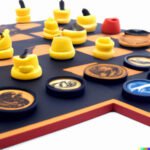The tradition of classic family board games has been a staple in households for decades, providing endless hours of entertainment and bonding for families around the world. These timeless games have stood the test of time and continue to be cherished by generations, offering a unique opportunity for families to come together and engage in friendly competition.
From the iconic Monopoly to the challenging Scrabble, classic family board games play an essential role in fostering social interaction and creating lasting memories.
In this article, we will explore the history and significance of classic family board games, as well as delve into the benefits they offer for families. We will also provide insights on popular classic board games and tips for selecting the right game for your family’s preferences and dynamics. Additionally, we will discuss how to organize a successful family game night featuring classic board games and provide ideas for enhancing these timeless games with DIY upgrades.
Furthermore, we will recommend classic board games suitable for different age groups and ponder on the future evolution of these beloved games in the modern era. Join us as we embark on an exploration of classic family board games and uncover their enduring charm.
Popular Classic Family Board Games
Classic family board games have been a staple in households for decades, providing entertainment and bonding opportunities for families. Some of the most beloved classic board games include Monopoly, Scrabble, Clue, and many more. These games have managed to withstand the test of time and have continued to be cherished by multiple generations.
One of the most popular classic family board games is Monopoly. Developed in 1933 during the Great Depression, Monopoly has become a timeless favorite among families. Its gameplay involves buying, selling, and trading properties to build wealth and bankrupting opponents. Scrabble is another classic game that has remained popular since its release in 1948. This word game challenges players to form words using letter tiles on a game board and has been known to improve vocabulary and spelling skills.
Clue, also known as Cluedo in some regions, is a murder mystery game that was first introduced in 1949. It requires players to move around the game board deducing who committed a murder, with what weapon, and in which room of a mansion. These classic family board games have not only provided hours of fun but also fostered healthy competition and critical thinking skills among players.
| Game | Release Year |
|---|---|
| Monopoly | 1933 |
| Scrabble | 1948 |
| Clue (Cluedo) | 1949 |
These classic family board games continue to bring joy and entertainment to families worldwide and are an essential part of any household’s collection. Whether it’s the strategy involved in Monopoly, the creativity required for Scrabble, or the deduction skills needed for Clue, these timeless games provide valuable opportunities for quality time and bonding among loved ones.
Benefits of Classic Family Board Games
Classic family board games have been a staple in households for decades, and for good reason. These timeless games are not only entertaining, but they also offer a wide range of cognitive, social, and emotional benefits for both children and adults. Playing classic family board games is an excellent way to promote critical thinking, problem-solving, and communication skills in a fun and engaging manner.
One of the key benefits of playing classic family board games is the enhancement of critical thinking skills. Games such as Scrabble and Clue require players to strategize, analyze information, and make tactical decisions. These activities help to stimulate the brain and improve logical reasoning abilities. Additionally, classic board games often involve elements of problem-solving, as players must figure out solutions to various challenges presented during gameplay.
Moreover, classic family board games provide an opportunity for social interaction and bonding within the family unit. As technology continues to dominate everyday life, it can be challenging to find activities that facilitate quality time together without distractions. Board games offer a screen-free environment where family members can engage in meaningful conversations, laughter, and friendly competition. This fosters stronger connections among family members and creates lasting memories that contribute to overall well-being.
Lastly, playing classic family board games can also help develop effective communication skills. Many board games require players to convey information clearly, negotiate with others, or engage in teamwork. These interactions encourage individuals to express themselves assertively yet respectfully. Furthermore, taking turns while playing promotes patience and good sportsmanship – important qualities that contribute to healthy relationships within families.
| Benefits | Description |
|---|---|
| Critical Thinking Skills | Classic family board games stimulate logical reasoning abilities and problem-solving skills. |
| Social Interaction | Board games offer a screen-free environment for meaningful conversations and friendly competition. |
| Communication Skills | Playing classic family board games encourages effective communication through clear expression and good sportsmanship. |
Tips for Choosing the Right Classic Family Board Game
When it comes to choosing the right classic family board game, there are several factors to consider to ensure that everyone in the family can enjoy and participate in the game. Here are some tips to help you make the best choice:
1. Age Appropriateness:
When selecting a classic family board game, it is important to consider the age of the players. Games like Candy Land or Chutes and Ladders are perfect for young children, while games like Clue and Monopoly are more suitable for older kids and adults. Make sure to choose a game that is appropriate for the youngest member of your family to avoid frustration and exclusion.
2. Number of Players:
Consider how many people will be participating in the game. Some classic family board games are designed for smaller groups, while others can accommodate larger gatherings. Games like Scrabble or Pictionary work well with multiple players, while games like Chess or Checkers are ideal for two players.
3. Game Duration:
Take into account the duration of the game when making your selection. Some classic family board games can be played relatively quickly, while others may require a longer time commitment. For example, a game of Sorry. or Trouble typically takes less time than a game of Risk or Monopoly.
Considering these factors will help you choose classic family board games that suit your family’s preferences and dynamics.
In addition to these tips, it’s important to consider everyone’s interests and preferences when selecting a classic family board game. Some families may prefer strategy-based games like Chess or Risk, while others may enjoy word-based games like Scrabble or Boggle. Ultimately, the goal is to choose a game that will bring everyone together for some quality bonding time over a fun and engaging activity.
How to Organize a Family Game Night
Hosting a family game night can be a great way to bring everyone together for some quality bonding time. It provides an opportunity for family members of all ages to come together and enjoy each other’s company in a fun and relaxed environment. Below are some tips for planning and hosting a successful family game night featuring classic board games.
Choose the Right Games
When organizing a family game night, it’s important to choose games that are suitable for players of different ages and skill levels. Classic family board games such as Monopoly, Scrabble, Clue, and Uno are great options that offer broad appeal and can accommodate varying abilities. It’s also a good idea to have a mix of competitive and cooperative games to cater to different playing styles and preferences within the family.
Set the Stage
Creating the right atmosphere can greatly enhance the experience of family game night. Set up a designated area in your home with ample seating, good lighting, and minimal distractions. Consider providing some snacks or refreshments to keep everyone energized and comfortable throughout the evening. You could even choose a theme for the evening, such as a Hawaiian luau or 80s throwback, to add an extra element of fun to the event.
Establish Ground Rules
To ensure that game night runs smoothly and fairly, it’s important to establish some ground rules at the outset. This could include things like taking turns, refraining from cheating or unsportsmanlike behavior, and showing good sportsmanship whether winning or losing. Setting these guidelines can help create a positive and inclusive atmosphere for everyone involved.
By taking these tips into consideration when organizing your family game night, you can create an enjoyable and memorable experience for all participants. Remember that the main goal is not necessarily about winning or competition but rather about coming together as a family to have fun, make memories, and strengthen bonds through playing classic family board games.
DIY Upgrades and Variations for Classic Family Board Games
Classic family board games have been a staple in households for decades, providing endless entertainment and bonding opportunities for families. However, over time, the same old games can become monotonous and lose their appeal. That’s where DIY upgrades and variations come in, allowing families to breathe new life into their beloved classic board games.
Creative Customization
One way to enhance classic family board games is by getting creative with customization. Whether it’s giving the game pieces a new look or creating personalized cards and game boards, adding a personal touch can make the gaming experience more meaningful and enjoyable for everyone involved. Families can also consider incorporating favorite themes or characters into the game to infuse some novelty into the classic game format.
Rule Modifications
Another way to liven up classic family board games is by introducing new rules or variations to the original gameplay. This could involve adding extra challenges, changing victory conditions, or implementing different strategies that add complexity and excitement to the game. By altering the rules of classic games such as Monopoly or Scrabble, families can keep these timeless favorites fresh and engaging.
Themed Game Nights
For an added twist, families can organize themed game nights centered around their favorite classic family board games. Whether it’s a medieval-themed night for playing chess or a mystery-themed evening for Clue, incorporating thematic elements into the gaming experience can make it even more immersive and entertaining. Hosting themed game nights also encourages creativity and allows family members to explore new ways of enjoying classic board games together.
By exploring DIY upgrades and variations for classic family board games, families can continue to appreciate these timeless favorites while injecting new energy and fun into their gaming routines.
Classic Family Board Games for Different Age Groups
Classic family board games hold a special place in the hearts of many, providing timeless enjoyment and bonding opportunities for people of all ages. When it comes to choosing the right classic family board game for different age groups, it’s essential to consider each player’s developmental stage and abilities. For preschoolers, simple games such as Candy Land, Chutes and Ladders, and Hi Ho.
Cherry-O can be great options to introduce them to the world of board games. These games often focus on color recognition, counting, and turn-taking, which are crucial skills for young children to develop.
As children grow older and gain more understanding of rules and strategies, classic family board games like Scrabble Junior, Sorry., and Uno become more suitable. These games offer a bit more complexity while still being engaging and fun for kids. For teenagers and adults, classic family board games like Monopoly, Clue, and Risk provide an opportunity for more strategic thinking and decision-making. The competitive aspect of these games can also appeal to older players who enjoy a challenge.
It’s worth noting that classic family board games can be modified to accommodate players of different ages by adjusting rules or providing alternative gameplay options. This flexibility allows families with mixed age groups to enjoy game nights together without anyone feeling left out or overwhelmed.
Ultimately, the enduring appeal of classic family board games lies in their ability to bring people together regardless of age, fostering meaningful connections and creating lasting memories. Whether it’s teaching young children valuable skills or challenging adults’ critical thinking abilities, classic family board games continue to stand the test of time as beloved sources of entertainment for all.
The Future of Classic Family Board Games
In conclusion, classic family board games have played a significant role in shaping the way families bond and interact with one another for generations. These timeless games, such as Monopoly, Scrabble, and Clue, continue to hold a special place in the hearts of both children and adults. Their enduring popularity is a testament to their ability to bring people together and create lasting memories.
The cognitive, social, and emotional benefits of classic family board games are undeniable. Not only do these games promote critical thinking, problem-solving, and communication skills in children and adults, but they also encourage healthy competition and teamwork. Through playing these games as a family, individuals can develop valuable life skills while enjoying quality time with their loved ones.
As we look towards the future, it is clear that classic family board games will continue to remain relevant in the modern era. While technology has become a dominant force in entertainment, the appeal of gathering around a table to play a classic board game with family members remains unchanged.
As families continue to seek meaningful ways to connect with one another amidst busy schedules and digital distractions, classic family board games will undoubtedly continue to serve as a timeless source of joy and togetherness.
Frequently Asked Questions
What Are the Most Played Classic Board Games?
Some of the most played classic board games include Monopoly, Scrabble, Chess, and Checkers. These games have stood the test of time and continue to be enjoyed by people of all ages.
What Is a Good Family Board Game?
A good family board game is one that can be enjoyed by both kids and adults, such as Ticket to Ride, Catan, or Codenames. These games encourage friendly competition and allow families to bond while having fun.
What Is the Most Popular Traditional Board Game?
The most popular traditional board game is probably Chess. Its origins date back over 1500 years and it has maintained its popularity throughout the centuries. Chess is a game of skill, strategy, and critical thinking that continues to engage players worldwide.

I love playing all kinds of games – from classics like Monopoly to modern favourites like Ticket to Ride.
I created this blog as a way to share my love of board games with others, and provide information on the latest releases and news in the industry.





